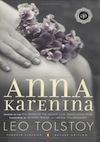Anna Karenina

Anna Karenina is a brilliantly conceived and poignantly written novel. Using many dynamic and well developed characters, Tolstoy unravels a marvelous tale of love and adultery set against the backdrop of late nineteenth century fashionable russian society. Tolstoy fairly represents each character presenting even those who have done wrong merely as fallible human beings who are doing their best. As a Christian Anarchist, Tolstoy believed that morality and social customs of the day were not necessary to follow, and this belief comes through clearly in this novel. Characters are ruled by chance, and they neither get rewarded for doing the right thing or reap the consequences of their mistakes; they are simply fated to be destroyed. This perspective in which it is written contributes to the somewhat dark and impersonal tone of the novel. There is no real good in this novel, apart from Konstantin Levin and his love for Kitty, and at the same time, there is no real evil. Characters like Stiva Oblonsky alternate between genuine compassion and kindness to lust and self absorption.
The structure of the book is one of its most masterful aspects. The story flows seamlessly between the lives of three different families, and, though these people are not always interacting, Tolstoy draws distinct comparisons between them to the reader. Overall, this is an engaging and worthwhile novel




